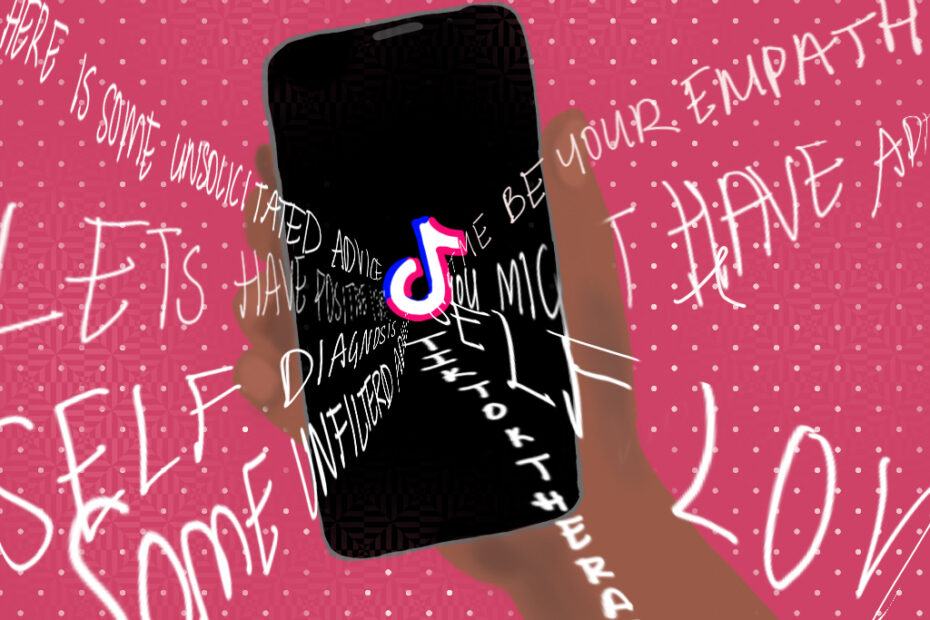By Anisah Sadiq Mahmoud, BA International Relations & Madihah Najeeb, BA Global Liberal Arts
The influence TikTok has had on everyone’s lives is never ending, as we find ourselves scrolling mindlessly through the app for hours on end and saving all kinds of videos. Whether it is make-up tutorials, recipe ideas, or visually pleasing edits that we think we will need to rewatch at some point in time; there is no denying that TikTok has reached a point where it is becoming the new ‘Google’. Users today of all ages, are finding answers through their curiosity and self-persuasion on the app.
TikTok ‘therapy’ is one of the many umbrella genres of videos appearing on the app that appeals to a wide range of users. You find yourself watching and listening to a minute-long video by someone, who is not a professional therapist, telling you signs that you may have ADHD, anxiety, or depression; aided by the aesthetics of low lighting and tranquil music to set the mood. Of course, not all ‘therapy’ videos do this, you will find TikTok’s that take a more positive approach by sharing messages of hope and wellness encouragement, that fall under the categories of “self-love” and “positive vibes.” Both kinds of videos seem to have this magnetising effect, which reflects how dependent we have become on social media and its content being the answers to queries and dilemmas.
“If you haven’t seen this kind of ‘advice’ on your feed, it is comprised of really unfavourable information about relationships that are portrayed as being ‘true’ or ‘realistic.'”
One key aspect in our lives that is monopolised on TikTok is relationship therapy and advice. Not all relationship advice is sound counselling, especially if it originates from a platform where users are all vying to portray relationships as simple situations. While some advice can be helpful, one should bear in mind that it’s easy to become stuck in the concepts of right and wrong, and consider this advice with caution. As we have repeatedly seen, these so-called therapists attempt to change word definitions to suit their argument. In times with such advice prevalent, is it essential to remember every couple’s relationship has unique boundaries and workings. If you haven’t seen this kind of “advice” on your feed, it consists of really unfavourable information about relationships that are portrayed as being “true” or “realistic.” It can cause overthinking, which is harmful to you personally and ultimately, can affect your relationship.
So why is this the case? Some of the main reasons it appeals to audiences are because it fits with the Help in the moment, Just when you need it motto. This idea is that you don’t have to pay for a professional therapist, book appointments, or attend sessions because the ‘answers’ you are looking for are on your phone. The convenience of this tends to outweigh the bigger picture, which is that you are listening and acting upon advice from a random account user that has self-certified their account to be known as a ‘professional therapist’. This essentially leads watchers and users to almost ‘self-diagnose’ themselves with mental health issues, based on what they have heard on the internet and inform others without having a formal assessment done.
Despite this, self-diagnosis as a result of this content can have a positive effect on marginalised communities. The therapy itself is often inaccessible for most people, due to prices or the lack of knowledge regarding resources for those of a lower economic class. The availability of finding videos where professional therapists give advice can aid people in day-to-day solutions and spark conversations of positive change.
Whilst some may view as harmful, others could see this as valuable as it is raising awareness on mental health issues, and the talk of mental health alone can be seen as positive, so it helps to combat the existing stigma in society. Given the positives and negatives, excessive use of TikTok therapy can lead to difficulties, such as social anxiety and self-image issues. Why should we go to such an extent to believe in information that is not medically accurate? If this is still an ongoing case, then the convenience of TikTok therapy will eventually outweigh the need to seek advice and medical support from professional therapists and medics, misleading millions.
Photo Caption: Tik Tok Therapy (Credit: Naaz Abdulnabi).
